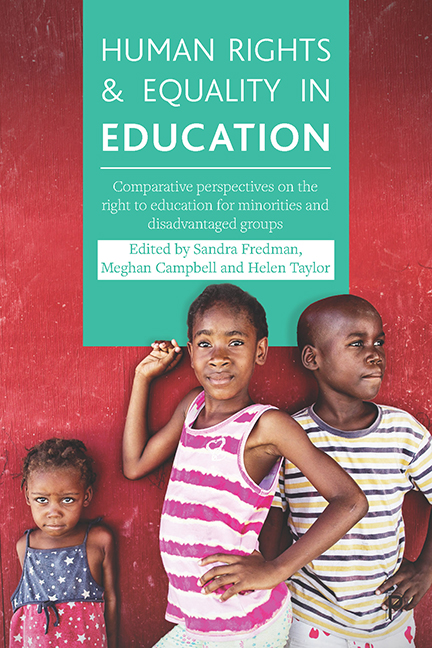 Human Rights and Equality in Education
Human Rights and Equality in Education Book contents
- Frontmatter
- Contents
- Notes on contributors
- Foreword
- Human rights and equality in education: Introduction
- Part I The role of public and private actors in education
- Part II Balancing the right to freedom of religion and culture and the right to education
- Part III Gender equality in education: moving beyond access to primary education
- Part IV Litigating for quality and equality in education
- Index
four - Calling the farce on minority schools
Published online by Cambridge University Press: 19 April 2022
- Frontmatter
- Contents
- Notes on contributors
- Foreword
- Human rights and equality in education: Introduction
- Part I The role of public and private actors in education
- Part II Balancing the right to freedom of religion and culture and the right to education
- Part III Gender equality in education: moving beyond access to primary education
- Part IV Litigating for quality and equality in education
- Index
Summary
Introduction
Over the last decade and a half we have witnessed radical changes in the development of the constitutional right to education in India. Education has moved from being included in the Directive Principles of State Policy, which was to be made justiciable within 10 years, to being held to be a part of the fundamental right to life under Article 21 of the Constitution and finally to being declared a fully fledged separate fundamental right under Article 21A. The constitutional amendment introducing Article 21A led to the enactment of the Right of Children to Free and Compulsory Education Act 2009 (RTE Act) which gave flesh and blood to the constitutional right to equal and quality education for all children between the ages of 6 and 14 years.
These developments have, however, not been without controversy, particularly with regard to the RTE Act's application to private schools. The Indian Supreme Court in Society for Unaided Schools of Rajasthan v. Union of India exempted private unaided minority schools from complying with the RTE Act. Two years later, in May 2014, the Supreme Court in Pramati Educational and Cultural Trust v. Union of India extended this exemption to include even minority schools that received grants from the state. Together, these two judgments have exempted all minority schools from the requirements of the RTE Act.
In this article, I argue that the consequences of the minority school exemptions from the RTE Act by the Supreme Court have led to the unfortunate result of a large number of private schools falsely clamouring for minority status. This is made possible by the ambiguous definition of what constitutes a minority institution and also the lack of clarity as to who is the authority that would declare schools to be minority schools. There is therefore an urgent need to review the definition of what constitutes a minority institution. But even more fundamentally, it is crucial to argue that minority schools should not be exempted from the norms and standards prescribed in the RTE Act that are necessary for quality education.
The first section of this chapter discusses the articulation of the right to education under the Indian Constitution, and the first phase of litigation under the RTE Act.
- Type
- Chapter
- Information
- Human Rights and Equality in EducationComparative Perspectives on the Right to Education for Minorities and Disadvantaged Groups, pp. 57 - 70Publisher: Bristol University PressPrint publication year: 2018


